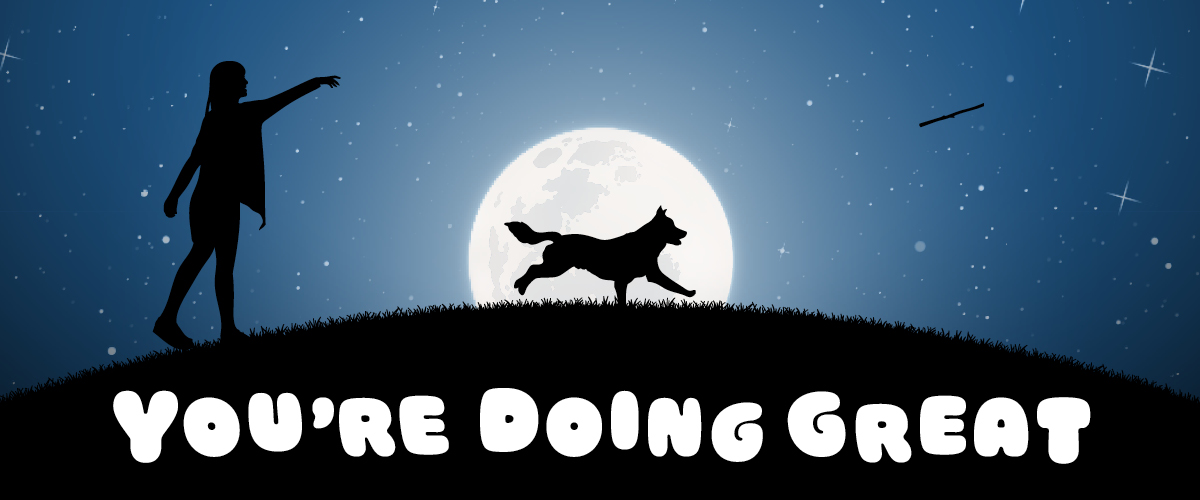
What a Kids' Cartoon Can Teach Us About Practicing Law
By Mike Mather
My kids watch a lot of Bluey. I mean, a lot. If they spend any time in front of the TV, you can bet it’s Bluey. So, naturally, I’ve seen it a few (hundred) times. If you have little ones in your life, you’ve probably caught it a time or two yourself.
In case you aren’t familiar, Bluey is an Australian public television phenomenon that follows a family of four Blue Heelers through daily life, all the while striking just the right balanced between—as my oldest puts it—funny and sweet, with a subtle touch of sarcasm. There is seriously something for everyone.
Last week, we watched an episode called “Baby Race.” It features Bluey’s mom, Chilli, reminiscing about Bluey learning how to walk. Chilli shares that Bluey was the first baby to roll over, but then another was the first to sit up. This, at least in Chilli’s mind, started a “baby race,” during which Chilli gets tunnel vision trying to make sure Bluey is the first baby to walk. Hilarity ensues. But no matter what Chilli does, Bluey always seems half a step behind, causing Chilli to feel like a failure. In a moment of despair, a more experienced mother reassures her that she’s “doing great.” With this encouragement, Chilli stops comparing herself to the other parents and begins to enjoy the journey.
Watching this episode got me thinking: can Bluey teach us something about being lawyers? Surprisingly, yeah!
This. Job. Is. Hard.
I’ve heard people say parenting is the hardest job there is. As someone who has tried both, practicing law isn’t far behind.
We may be slow to acknowledge it, but the reality is practicing law is hard. As members of the Bar we’re entrusted with a responsibility to our clients and the public to educate, interpret, advance, and uphold the law. In fulfilling this responsibility, an attorney is tasked with navigating a complex matrix of facts, statutes, history, and personalities. These exercises are not merely academic. Even the most routine matters to us can be monumental for our clients. This is to say nothing about the business of practicing or the near constant advent of new technologies (I see you over there, AI), which each bring their own set of unique challenges to the table.
Now, don’t mistake this for a complaint or an excuse. These challenges are what drove us to be lawyers in the first place. Yet, recognizing this reality for what it is gives us the opportunity to shed the burden and create space to be the best versions of ourselves.
Continually Re-evaluate
After each failed attempt, Chilli refocused her strategy applying what she learned to her next attempt. She started with simple encouragement. When that didn’t work, demonstrations, and finally hands-on training.
This same mindset can be applied to our own decision-making process. While many map their careers during law school, it is unlikely these plans will hold without deviation for long. Goals, values, and measures of success change over time. Top priorities at the beginning of a career fade into the background after gaining experience. Initial career goals are achieved; new goals are set. Said plainly: life happens, and we adapt.
Be mindful of these shifting priorities and regularly evaluate where you are against where you want to be and what you want to achieve. If your current path doesn’t align with those priorities, don’t be afraid to make a change.
“Doing Nothing” Is Always An Option
Ultimately Chilli stops trying to force it and lets nature take over. This ultimately leads to the desired result.
Lawyers, like most people, often feel the tug to do something, mistakenly confusing the concept of action with progress. They are not always the same thing. Sometimes, doing nothing—and letting things play out—is the best option for a given situation. Do not lose sight of this fact.
Sometimes, You Need to Fail to Succeed
More often than not, success is achieved only after a few bumps in the road. Consider Chilli’s experience. Had she immediately succeeded, we would have seven fewer minutes of the endearing chaos of the Heller family (and I’d need a different analogy to get through this article). However, it was these failures that gave Chilli room to achieve her goal.
The same holds true for us. The most impactful lessons rarely come from success. Rather, it’s our setbacks, both big and small, that provide those crucial opportunities. Remember, these setbacks are not failures, but opportunities to grow, both professionally and personally. Don’t miss an opportunity.
Run Your Own Race
Chilli’s inability to control the situation quickly leads to frustration and self-doubt. This is directly tied to comparing her results with those of others. Resolution only comes when someone suggests—and Chilli embraces—the idea of “running her own race.”
As an outside observer, it’s easy to see that Chilli feeling bad about losing the “baby race” was unjustified. No matter how hard you try, you can’t force a child to walk. Yet, when we find ourselves in these situations, the response is all too relatable.
Lawyers are trained advocates, surgically dissecting a set of facts and applying them to a body of law to advocate a position. This skill is our stock in trade. However, while these skills are invaluable in the professional context, they can be dangerously destructive when turned inward.
Be aware of the tendency to over-analyze, and don’t let this paralyze you into a fear of taking risks, particularly when you have a chance to grow professionally, personally, or otherwise. If you have an interest, pursue it. If you have an opportunity, take it. Measure success in incremental steps and focus on making forward progress every day. Over time something that once seemed unreachable can be achieved.
Mike Mather is general counsel for HealthEZ, a national health benefits innovator for self-funded health plans.